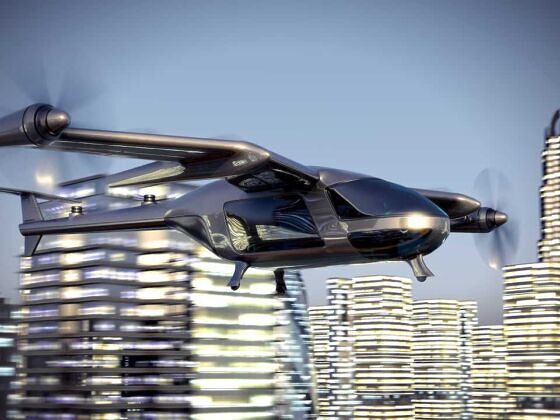In a mark of progress for tech nerds, aviation geeks, and environmentalists alike, France plans to debut flying air taxis at the 2024 Summer Olympic Games in Paris, according to a recent report in The Guardian. The feat could mark the first mainstream use of a technology that has filled the pages of science fiction books and the imaginations of creators around the world for decades. These taxis are, in essence, flying cars.

Paris to Debut Electric Flying Taxis for 2024 Olympic Games
The city has a fairly straightforward plan for using and managing the taxi system. The city plans to open two routes: one between its two major airports and another connecting two “skyports” in neighborhoods in the south of the city that will play a critical traffic role for fans and athletes attending the games. In advance of 2024, 30 air taxi manufacturers — yes, 30! — will compete to see which are permitted and/or contracted to develop and operate these eVTOLs (electric vertical take-off and landing) machines. Testing kicked off in November. Paris is also working with British company Skyports to build, perhaps not surprisingly, skyports, where the taxis will land.
The arrival of flying mass transit is something of a coming-of-age moment for a concept that has long been dreamed of, discussed, and debated by entrepreneurs, tech geeks, and fans of eco-friendly city solutions. Established companies like Rolls Royce and fresh startups including Archer and Volocopter have been making bold announcements of flying taxis’ impending arrival for years. It’s begun to sound like a “boy who cried wolf” situation, but Paris 2024 looks to be the time that the wolf actually shows up. And the wolf id going to do wonders for reducing air pollution.
The Climate Win here is two-fold. First, the air taxis themselves are electric and need no fossil fuels, which means the spectators and athletic participants flying around in these eVTOLs are moving about a major metropolitan area with zero added emissions. Second, every person flown in the air taxis is one less person traveling by ground taxi, reducing the inevitable congestion that happens when tens of thousands of people cram all at once into an already crowded metropolitan area. The city’s subway system and other public transit options will remain in use during the games. Details like costs, reservations, and frequency will be announced closer to the start of the games.
More climate wins this week
The Great Barrier Reef underwent a massive spawning event this year, Freethink reported. Coral (which is a live animal and not a plant), spawns annually. The coral release sperm and eggs into the surrounding water during the spawn, ultimately birthing new coral to help the reef grow. Australia’s recent spawning was so dense that it nearly resembles an underwater blizzard and is especially promising for the threatened reef because it proves that the reef still has recovery power left – if only it can catch a break from bleaching events. A 2020 study from the ARC Centre of Excellence for Coral Reef Studies at James Cook University in Queensland found that half of the coral on the Great Barrier Reef’s 2,900 individual reefs had died between 1995 and 2017, so the spawning news is extremely welcome.
Nebraska’s publicly-owned utility companies announced they would transition entirely to clean energy by 2040 and 2050, earlier this year. Now, the directors of the Nebraska Public Power District voted to move towards net-zero emissions by 2050. The move makes Nebraska the first red state to enact such a plan to decarbonize its entire power sector.
And finally, some goodbyes are forever. Scotland said “mar sin leat” to its legacy of coal power this week. The Guardian reported on the planned destruction of the chimney at the country’s largest coal power plant, which shut operations in 2016. The chimney had been Scotland’s largest freestanding structure, a title that now belongs to the Glasgow Tower.